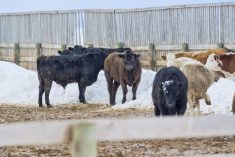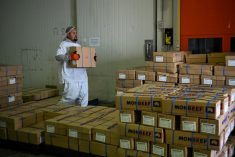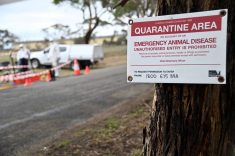Reuters — Australia and New Zealand say they’ve stepped up protections against foot-and-mouth disease (FMD) at their international airports following an outbreak of the disease in Indonesia.
Travellers arriving in Australia from Indonesia will now be asked to walk across sanitation foot mats at airports, the latest measure to ramp up Australia’s biosecurity measures, the government said.
The mats will contain a citric acid solution designed to dislodge any dirt from the sole of the shoe and cover it in the acid.
Read Also

JBS profit falls amid still-challenging US market environment
JBS, the world’s largest meat company, reported a net profit fall in the third quarter in spite of a rise in global net sales amid a still-challenging beef market environment in the U.S., according to an earnings statement on Thursday.
The move comes after FMD viral fragments were detected in meat goods that came into Australia recently from Indonesia and China, Agriculture Minister Murray Watt said Wednesday at a news conference.
“We have detected foot-and-mouth disease and African swine fever viral fragments in a small number of pork products for sale in the Melbourne CBD that were imported from China,” Watt said, adding that these were detected during routine checks.
“In addition to this a passenger travelling from Indonesia has in recent days been intercepted with a beef product that they didn’t declare which tested positive for foot and mouth disease viral fragments,” he added.
These viral fragments are not live and cannot be transmitted, he said.
Watt also said despite these findings Australia remains FMD-free.
More than 317,000 animals have been infected with FMD in 21 Indonesian provinces, largely on the most populated islands of Java and Sumatra, with more than 3,400 animals culled, according to government data.
Countries deemed FMD-free also still include, among others, New Zealand, Canada, the U.S., Mexico, Japan, Chile, the U.K. and all European Union countries except Bulgaria. FMD was last reported in Canada in 1952.
Biosecurity New Zealand this week also introduced foot mats with disinfecting chemicals for arrivals from Indonesia to ensure footwear is clear of the virus. A campaign has been launched to educate travellers going to Bali of the issues.
There is an on-the-ground audit happening of the supply chain for animal feed palm kernel, New Zealand officials said, and that government is providing equipment to Indonesia to help contain the virus there.
Government modelling in Australia projects a widespread FMD outbreak in that country would have an estimated direct economic impact of around A$80 billion (C$71 billion).
What is FMD?
FMD is a severe and highly contagious viral disease affecting cattle, hogs, sheep, goats, deer, bison and other cloven-hoofed domestic and wild ruminants, appearing mainly as blister-like sores and lesions on animals’ feet and mouths.
Cases in people usually relate to consuming infected milk or having direct contact with FMD blisters. Cases in people are considered extremely rare, however, and are not to be confused with hand, foot and mouth disease, a separate viral illness in people.
Livestock and animal products such as fresh meat, embryos, semen, milk products, wool, hides and skins from susceptible species from FMD-infected countries are prohibited from entering Canada, unless they’ve been processed in order to destroy the FMD virus.
Only “cooked, commercially prepared, hermetically sealed” meat is allowed into Canada from countries that have FMD. For Canadian customs and food inspection purposes, “FMD-infected” denotes any country that has at least one confirmed FMD case.
Farmers or farm workers who come to Canada after travel to FMD-infected countries are advised to follow CFIA recommendations on cleaning and disinfection of their clothes, shoes and other items — and, if they visit farms while in those countries, should declare that to Canadian border officials upon return. Contact with farm animals is not recommended for at least five days.
— Includes files from Glacier FarmMedia Network staff.














